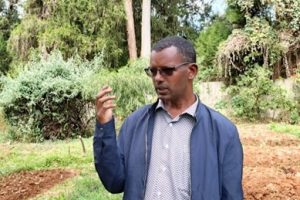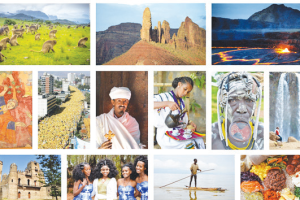
For the past few years, the Ethiopian tourism industry was growing steadily following various measures being undertaken by the government to promote the sector. However, in the past two and three years, the COVID-19 pandemic and the conflict in the northern part of the country have hugely affected the tourism sector. Thus, numerous tourism and related business practitioners have been compelled to shift to other businesses and lost their income.
Therefore, a multi-sectoral collaboration is needed to stimulate back the country’s tourism and return tourism businesses in the war affected areas of Tigray and Amhara states. Despite, being home to the famous natural and man-made tourist destinations, the two states, owing to the conflict, registered the lowest tourists’ arrival during the past two years and lost significant income from the tourism sector.
Recently, the Aksum Tourism and Culture Bureau announced that following the atmosphere of peace and stability restored in the Aksum town; the world-famous Aksum Obelisk is now re-opened for international and local visitors.
The Tigray Tourism Bureau Head Gebremedhin Fitsumbrehan said that the tangible and intangible heritages that are found in the town and its surrounding areas are now open for tourists. He said that the active public participation in financial and an expertise supports enable to open the heritages for visitors.
Following this, various training has been given to the sector practitioners in the town including hoteliers, tour guides, and translators, among others to resume the services. According to him, before the outbreak of the pandemic and the conflict, more than 30,000 tourists used to visit the town of Axum and its surrounding areas annually. In turn, he indicated that visitors enable the town to generate more than 180 million Birr per annum from the tourism sector.
The ancient city of Aksum obelisk is found close to Ethiopia’s northern border. The Obelisks mark the location of the heart of ancient Ethiopia, when the Kingdom of Aksum was the most powerful state between the Eastern Roman Empire and Persia.
The massive ruins, dating between the 1st and the 13th century A.D., include monolithic obelisks, giant stelae, royal tombs and the ruins of ancient castles. Long after its political decline in the 10th century, Ethiopian emperors continued to be crowned in Aksum. Moreover, Ethiopia’s tourism goals could be achieved through the meaningful participation of all actors from the technology, manufacturing, agriculture, and other sectors at a time, tourism experts underscored.
Approached by the Ethiopian Press Agency (EPA), Tourism State Minister Sileshi Girma stated that the country could achieve its tourism goals through the combined efforts of different actors. Tourism plays a great role in connecting the national development plan of Ethiopia with many sectors that the Ministry is working to attain the set targets and enhance the partnership of the public-private sectors to this end.
Since the nation is the source of coffee, Abbay River and being a cradle of human beings, investing in the tourism sector is viable and appropriate to compete in the global arena. Tourism promotion needs the integration with information technology, road, airport, and sanitation to develop more and provide quality services to the tourists,
“Tourism is one of the most important sectors to achieve Ethiopia’s sustainable development goals and we are trying our best in developing tourist attraction sites. Moreover, the private sector has been hugely investing in the construction of star- designated hotels, lodges and resorts across tourist attraction sites.”
“Universities have great potential to modernize the tourism sector by conducting viable research and providing consultation to the sector apart from the teaching-learning process. Tourism needs continuous research as it is a dynamic sector as well as needs to follow up and carry out recommendations every time to be competent at international level.”
The Addis Ababa University Vice President for Research and Technology Transfer Prof. Mitike Molla also said that the University has been inculcating innovative ideas to the tourism industry and to solve problems the sector has been facing based on research.
AAU’s involves in the tourism sector based on three pillars such as research, community service and teaching- learning. She said that the University has been conducting viable research to contribute to the national development in various sectors including tourism which is done by scholars in the field.
Speaking to the local media, Tourism State Minister Selamawit Dawit on her part said that the new projects being undertaking in the country are vital to revive the tourism business that was impacted by the conflict and Covid-19 pandemic.
As to her, although Ethiopia is blessed with enormous tourism potentials, infrastructural setbacks and other challenges hindered its capacity to exploit such potential. Therefore, addressing infrastructural issues in the tourist destination areas and availing state of the art touristic services are fundamental to stimulate the sector.
More importantly, augmenting the country’s tourist inflow and ensuring its competitiveness with other African countries is possible through providing successive support to the sector practitioners and encouraging youths to join the sector after qualifying with concerned bodies.
In the same way, hotels, tour guides, souvenir shop owners, transportation services providers, among others operating in the tourism sector also need tangible support to resume their business and provide tourists with standardized services, experts recommended.
BY TEWODROS KASSA
THE ETHIOPIAN HERALD FRIDAY 30 JUNE 2023




